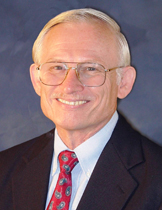
Bill Kaplin joined the law faculty in 1970 and was a tenured full professor from 1978 to 2007. He was a Research Professor of Law from 2007-2013. He specializes in education law and policy and in constitutional law. He has also been special counsel to the university since 1981. In 1984-85, he served as founding director of the law school's Law and Public Policy Program.
Professor Kaplin has been a visiting professor at Cornell University (spring sem. 1975), at Wake Forest University (1990-91), and at Stetson University College of Law (2005-06). He has also been a visiting scholar at the Institute for Educational Leadership, George Washington University (1976-77), distinguished visiting scholar at the Institute for Higher Education Law and Governance, University of Houston Law Center (fall sem. 1991), a visiting scholar at Wake Forest (spring sem. 2000). and a scholar-in-residence at Stetson (spring sem. 2000). During the spring semesters, he is now Distinguished Professorial Lecturer at Stetson.
Professor Kaplin's books include: The Law of Higher Education: A Comprehensive Guide to the Legal Implications of Administrative Decision Making (with Barbara A. Lee) (4th ed., Jossey-Bass/Wiley, 2006); A Legal Guide for Student Affairs Professionals (with Barbara A. Lee) (2d ed., Jossey-Bass/Wiley, 2009); and American Constitutional Law: An Overview, Analysis, and Integration (Carolina Academic Press, 2004). The first edition of The Law of Higher Education was recognized by the American Council on Education as the year's most outstanding book on higher education. An earlier work of Professor Kaplin's, State, School, and Family: Cases and Materials on Law Education (Matthew Bender, 1973 & 2nd. ed. 1979) (with Sorgen, Duffy, and Margolin) was the first law school casebook on education law in the United States.
Professor Kaplin is the past chair of the Education Law Section of the Association of American Law Schools, the former editor of the Journal of College and University Law, and a former member of the Education Appeal Board of the U.S. Department of Education. He is currently Senior Fellow at the Center for Excellence in Higher Education Law and Policy, Stetson University; a member of the Editorial Board of the Journal of College and University Law, a mentor/leader for the bi-annual Houston Higher Education Law Roundtable; and a member of the U.S./U.K. Roundtable on Higher Education Law. He has been awarded the American Council on Education's Borden Award, the Association of Student Judicial Affairs' D. Parker Young Award, and the 20th Anniversary Scholarship Award presented by the Annual National Conference on Law and Higher Education, and has been selected as a Fellow of the National Association of College and University Attorneys.
In 2008, the Stetson University College of Law and its Center for Excellence in Higher Education Law and Policy established an award in Professor Kaplin's honor, the William Kaplin Law and Policy Scholarship Award, to be presented annually to an outstanding scholar in recognition of work interrelating higher education law and policy.
For further information on Professor Kaplin's books on higher education law,
and for recent developments in higher education law posted by Professor
Kaplin and his co-author, go to https://www.nacua.org/about-nacua/honors-and-awards/life-membership/william-a-kaplin
SELECTED PUBLICATIONS
Books:
1) A Legal Guide for Student Affairs Professionals, 2d ed. (Jossey-Bass/Wiley, 2009) (with Barbara Lee).
2) The Law of Higher Education: A Comprehensive Guide to Legal Implications of Administrative Decision Making, 4th ed. (Jossey-Bass/Wiley, 2006) (with Barbara Lee) (2 vols.).
3) The Law of Higher Education Fourth Edition: Student Version (Jossey-Bass/Wiley, 2007) (with Barbara Lee) (1 vol. paperback).
4) Cases, Problems, and Materials for Use with The Law of Higher Education, 4th Edition (Nat'l. Ass'n. of College and University Attys, 2006) (with Barbara Lee) ( electronic, 863 pp.); and Cases, Problems, and Materials for Use with LHE 4th: the Student Version (Nat'l Ass'n of College and University Attys, 2007) (both with Barbara Lee).
5) American Constitutional Law: An Overview, Analysis, and Integration (Carolina Academic Press, 2004).
Articles and Book Chapters
1) "Fiscal Inequity and Resegregation: Two Pressing
Mutual Concerns of K-12 Education and Higher
Education," in Dyson & Weddle (eds.), Our Promise:
Achieving Educational Equity for America's Children
(Carolina Academic Press, 2008).
2) "A Typology and Critique of Title IX Sexual
Harassment Law After Gebser and Davis," 26 J. of Coll.
and Univ. L. 615 (2000).
3) "Problem Solving and Storytelling in Constitutional
Law Courses," 21 Seattle L. Rev. 101 (1998) (excerpted
in Teaching the Law School Curriculum (Carolina
Academic Press, 2004)).
4) "A Proposed Process for Managing the First
Amendment Aspects of Campus Hate Speech," 63 J. of
Higher Educ. 517 (1992) (symposium issue).
5) "The Process of Constitutional Interpretation: A
Synthesis of the Present and a Guide to the Future," 42
Rutgers L. Rev. 983 (1990).
6) "Accrediting Agencies' Legal Responsibilities: In
Pursuit of the Public Interest," 12 J. of Law & Educ. 87
(1983).
7) "Professional Power and Judicial Review: The Health
Professions," 44 Geo. Wash. L. Rev. 710 (1976).
Monographs, Reports, Misc.:
1) Equity, Accountability, and Governance: Three
Pressing Mutual Concerns of Higher Education of
Elementary/Secondary Education, IHELG Monograph 06-
01 (Institute of Higher Education Law and Governance,
2007).
2) "Preventive Law: How Colleges Can Avoid Legal
Problems," Chron. of Higher Educ. (April 8, 2003), B20
(with Kathleen Santora).
3) "Rick's Revenge: A Case Study on Cyberspace
Speech and Peer Harassment at State University" (with
Gary Pavela), distributed by Center for Dispute
Resolution, Willamette Univ. College of Law; reprinted in
part in 9 Synthesis: Law and Policy in Higher Education
675 (Winter 1998).
4) The Importance of Process in Campus Administrative
Decision-making, IHELG Monograph 91-10)
(Institute for Higher Education Law and Governance,
1992).
5) Respective Roles of Federal Government, State
Governments, and Private Accrediting Agencies in
the Governance of Postsecondary Education
(Council on Postsecondary Accreditation, 1975).
WEBSITE
For further information on Professor Kaplin's books on higher education law,
and for recent developments in higher education law posted by Professor
Kaplin and his co-author, go to https://www.nacua.org/about-nacua/honors-and-awards/life-membership/william-a-kaplin
